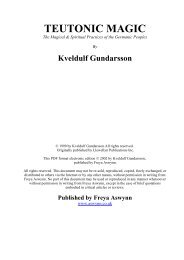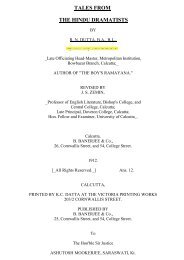Untitled - Awaken Video
Untitled - Awaken Video
Untitled - Awaken Video
Create successful ePaper yourself
Turn your PDF publications into a flip-book with our unique Google optimized e-Paper software.
Chapter 3. Midgard 87<br />
have taken this to mean that the poem itself is not representative of pre-Christian<br />
ethics. R. I. Page in Chronicles of the Vikings addresses this issue:<br />
“In recent years there have been attempts to divert much of this material<br />
to the post-Christian phase of the Viking Age, and indeed to as late as the<br />
twelfth century. . . . It is fairly clear, at any rate to the unbiased, that<br />
(whatever the date of its edition into a composite Hávamál) a good deal of<br />
the poem derives from earlier times. Also that a good deal of it illustrates<br />
aspects of the Viking Age not otherwise recorded, notably the life of the poor<br />
or underprivileged.” 38<br />
Regardless of whether “godless men” composed part of the poem, or that it came<br />
into its final edition during the post-Christian Era, the poem’s content is consistent<br />
with behaviors recorded in writings from Tacitus (in the 1st century CE) on up<br />
through the Age of the Saga (700 CE through 1300 CE). The phenomenon of the<br />
“godless man” seems to have been a by-product of the Viking Age possibly due to<br />
lack of exposure to one’s own homeland (community) and one’s cultural history, but<br />
it did not change the knowledge that one needed to interact with power/ luck.<br />
The conversion to Christianity apparently did not affect the common man’s<br />
knowledge/ worldview that one needed to interact with one’s environment in a<br />
harmonious fashion, and that resolution is a far better means to an end than all out<br />
extermination. Perhaps man had forgotten about the original war between the tribes<br />
of Gods, but the noble method of bringing such a problem to a good conclusion was<br />
held in the folk-memory to the point where the Scandinavian countries of Sweden,<br />
Norway, and even Finland, at least, have been able to maintain neutrality in the<br />
world political arena for most of the current millennium. And, although Christianity<br />
has been able to change the face of much folk philosophy it has been unable to wipe<br />
out completely the folk belief that one needs to interact honorably and respectfully<br />
with the spirits that also form a part of this world, whether ancestral, land/ water,<br />
or domestic.<br />
The so-called New Age has really been an attempt at turning the modern folk<br />
mind back toward a concern for the environment and the land; however, this same<br />
group of people has turned its view away from their own cultural heritage and<br />
towards eastern philosophies or Native American. Eastern, Native American, and<br />
Germanic philosophies, although having some things in common, are very different<br />
in both approach and practice. As mentioned earlier, the ultimate goal of the eastern<br />
philosophies is to blend into the One (the first bardo), but the goals of the ancient<br />
northern Europeans appear to have been to make peace with the third (everyday<br />
reality) and second bardos (hallucinations and “second-sight” being here equated)<br />
38 ibid. p. 140.
















